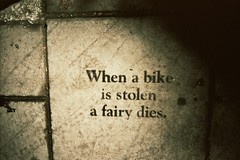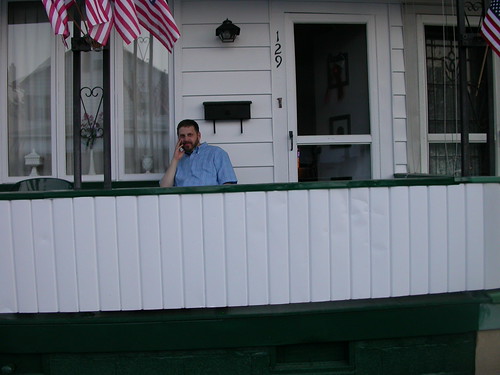Once a week, I get a newsletter in my in-box from Rob Brezhny, the poet astrologer. Rob never predicts that we're going to fall in love. Or come into a fortune. His forecasts are more ephemeral than that. He is, as I said, a poet.
More than once, I've printed one up and taped it into my notebook. This one was so lovely, I thought I'd tape it here.
LEO (July 23-Aug. 22): Travel writer Bruce Chatwin walked around
Australia as he researched and meditated on the indigenous people's
beliefs about what the land was like in the ancient past. He wrote:
"Aboriginal creation myths tell of the legendary totemic beings who
wandered over the continent in the Dreamtime, singing out the name of everything that crossed their path--birds, animals, plants, rocks,
waterholes--and so singing the world into existence." Given the fact that you're now primed to create a new domain or two, Leo, may I suggest the aborigines' approach? You'll infuse everything with extra beauty if you play around with *singing* it into existence.
*Addendum: I am not accustomed to censoring myself for being too joyful. But I did today. In this post. I excised the final paragraph because it was simply too exultant in a world and on a day when I am well aware of the sorrows taking place elsewhere. But I did not delete the photograph of the child singing. We need to be hold this in our minds and hearts: this is what childhood should be like.
You do not need to leave your room. Remain sitting at your table and listen. Do not even listen, simply wait, be quiet, still and solitary. The world will freely offer itself to you to be unmasked, it has no choice, it will roll in ecstasy at your feet. --FRANZ KAFKA
Wednesday, July 26, 2006
SINGING THE WORLD INTO EXISTENCE
Tuesday, July 25, 2006
THIS IS NOT AN ADVERTISEMENT

paquete amazon
Originally uploaded by jmerelo.
This is not an advertisement.
SIMPLY WAIT is not a blog that was created to promote me or my book.
Indeed, the book didn't even exist when SIMPLY WAIT began.
Since the sale that changed my life, the blog has remained pretty much the same.
I like that.
It's a place where I talk to some very interesting people. And amazingly, they talk back.
Sometimes, they--no YOU--agree with me, and that is delightful.
Sometimes YOU don't. Also delightful.
Frequently YOU make me question myself, think wider deeper thoughts, challenge myself.
THAT remains the raison d'etre for SIMPLY WAIT.
I have not written about the day to day developments in my writing career.
And I won't.
BUT...
A couple of weeks ago, an astute blog reader e-mailed to say that my novel was up on Amazon. (Thank you, J.F.)
Oh, I was excited!
And tempted to post a link...
But I didn't.
Because this is not an advertisement.
And because the subject matter listed on Amazon was: 1) Judaism 2) Religion 3) Psychological fiction.
While #s 1 and 2 are fascinating topics, they have nothing to do with my novel.
THE LIAR'S DIARY is about 1) family dynamics 2) psychological suspense 3) friendship.
The novel will not be out till February 1st, but if YOU want to, you can pre-order.
No one has done so yet.
Not even me.
The sales number is a perfect 0.
You could change that.
It's a risk.You might hate the book and be out fifteen bucks plus S & H.
Then again, it might change your life. Probably won't, but it might.
My one guarantee? This novel will hold your interest to the end.
So pre-order.
Or don't. (I will still love you.)
Damn.
Maybe this is an advertisement.
Monday, July 24, 2006
THEFT

when a bike is stolen a fairy dies
Originally uploaded by knautia.
“There is one sin, only one. And that is theft. Every other sin is a variation of theft. Do you understand that? When you kill a man, you steal a life. You steal his wife’s right to a husband, rob his children of a father.When you tell a lie, you steal someone’s right to the truth. When you cheat, you steal the right to fairness. Do you see?”
--from THE KITE RUNNER by Khaled Hosseini
I was maybe six or seven, and I was playing at my cousin’s house. For the first time, I noticed that she had more than I did. She had three sisters who filled the house with their shouts and squabbles and games and I was an only child. The only sounds that erupted in my house were made by my parents: laughing, scheming their lives as adults do, quite frequently quarreling. There was no one to huddle with me in another room and talk about what it all meant. I often felt lonely.
My cousin had a huge room with capacious windows that looked out on an oval-shaped pool, and sprawling green lawns; there was a real live horse in the barn. My room was the size of a large closet attached to my parents room. My father laughed when I told him I wanted a horse. “If you’re not married when you’re twenty-three, I’ll buy you one,” he promised on more than one occasion. I vowed to wait to the wizened old age of forty if that was what it took, but never even made it to the twenty-three-year-old deadline. Which was okay. I didn’t want a horse by then anyway--a fact my crafty father was surely betting on.
But most significantly of all, my cousin had many more dolls and doll accessories than I did. My eye was particularly attracted by a pair of red checked underpants for her baby doll. When my cousin left the room, I jammed them in my pocket. They seemed to represent everything I thought I didn’t have.
But even before I got home, the thrill of possession was spoiled for me. In the weeks that followed, I was beseiged by guilt and fear of punishment that were worthy of a character from Dostoyevsky. Now when my mother asked me if I wanted to visit my cousin, I feigned illness. What if she knew? What if she’d told her family? I burned with shame.
My doll never wore the red checked underpants. They weren’t the thing I wanted anyway. How had I ever been tricked into thinking they were? I hid them in a cigar box and buried them in the woods near my house. I can still remember digging the hole with my hands. Clawing, it was.
Years later, my cousin and I laughed about the incident, about the months I’d spent refusing to walk past the police station for fear I’d be arrested. If she ever noticed the underpants were missing, she’d long forgotten it, teaching me one thing for certain: however much theft hurts the victim, it hurts the thief more. If you don’t believe me, think of those soul-dead minions who steal Peace, who steal the Air we breathe, who would steal the Future itself in exchange for something as deceptive and illusory as the red doll undies.
In the end, the thing that tormented me most was the way my theft dishonored the life I did have. Coveting the pool outside my cousin’s window seemed like the basest ingratitude for the amazing tree outside my own. Longing for the sounds of my cousin’s house, I didn’t hear the sacred noise inside mine: the laughing and whispering and shouting that signalled my parents’ passionate engagement with each other, with me, and with their world.
Now even the arguments seem like something worth honoring. For fifty-two years, my parents wrestled some powerful personal demons together and they never gave up. That the struggle created some clatter and boom no longer surprises or disturbs me; in fact, I admire it. And in the end, I can say conclusiviely that the laughter won; the love won. What greater legacy is there than that?
******************************************************
For a truly delightful take on Theft and a link to many more visit the divine Laini.
Meanwhile, Qarrtsiluni is publishing a series of shorts. The challenge is to encapsulate and intensify in pieces of 100 words or less. Several of my favorite bloggers more than meet it. The waitress in me particularly relished "Petey's" by Leslee of Third House.
For those who can't get enough of the short short, I discovered 400 Words via Sarah Salway. There's a veritable feast to be found there--not to mention lots of ideas for blog posts, if anyone feels the tank runnning low.
Friday, July 21, 2006
THE FINE ART OF LOITERING

No Loitering
Originally uploaded by Cam B..
One of the best things about being a college student is that you have permission to loiter. On campus, you can sit for hours in coffee shops, wander the stacks of the library with no apparent purpose, perusing whatever volume catches your eye. Or you can find a green spot and simply sit on the earth. There, in the green patch you've claimed as your own, you can take out a sketchbook or a writing pad and reinvent the world or you can be still and allow it to pass through you as it is--in all its serenity and tumult. You can loiter with friends or you can do it in perfect solitude.
When I was a student, I was a world class loiterer. In fact, it was my undeclared, major. I loitered in all the ways and places listed above. But my favorite place to pass the time was in the horse barn. I spent so many hours marvelling over the grace and power of the animals that they came to know me.
When I entered, Flintlock, the haughty stallion I most admired always turned his back. I imagined him saying, "Oh, it's only her again."
And the pale horse who always came to greet me would have been forced to explain my strange, human behavior. "Leave her alone. She's working toward a degree in the fine art of loitering."
It's something animals understand well.
Sometime, toward the end of my time at the University, I felt myself growing impatient for the grit and challenge of life off-campus. It was, I suppose, a healthy impulse, a preparation for the change ahead.
And most of the time, I rather enjoy life in the so-called real world. The only problem is that it offers little opportunity to use my "degree". In my town, loiterers are frowned upon. Those who walk the streets for hours with no purpose, stop to sit on public grasses, or even spend too much time in the town library are suspected of being indigent, drug-addled, dangerous. To be fair, sometimes they are.
This week, however, has been an exceptional one for my inner-loiterer. On Tuesday night, I spent seven hours in a local cafe talking to a writer friend who was visiting from Canada. Time passed, the waitresses changed shift, and we continued to talk.
We had entered the place in bright sunshine, the streets filled with tourists eating ice-cream; and by the time, we left those same streets had become transformed into a dark and lonely place.
The following day I visited a small college town a couple of hours away. It is one of the most affluent, educated communities on the East coast, a place where there was no fear of loiterers. In fact, lingering and contemplating is encouraged by the design and attitudes of the town. Local employees took their lunch on the grass. No one looked askance when I found a tree, and set up camp with my lemonade and my notebook. There were comfortable chairs and footstools in every corner of the magnificent library.
Like Goldilocks, I tried every one. In one corner, I found some excellent books about Japan. In another, I lost a couple hours to the poetry collection. (When I discovered two volumes by Paul Zweig, I immediately reached for them, thinking of Dave who introduced me to him.) Then I went outside took in the bright colors of the world. No one seemed to question what I was doing. Loitering was the task of the day, and it was a day well spent.
Of course, we can't spend all our days wandering and thinking and reading poetry. Books would not be written; crops would wither in the fields; the gas bill would never be paid. And in the end, like a college student on the verge of graduation, we hunger for the demands and challenges of work--whatever that word entails for us. But if we never loiter, if we construct our towns from designs and attitudes that subtly or not so subtly prevent or condemn it, we lose something essential. Something that even horses innately understand.
Sunday, July 09, 2006
HOTEL

Fairy Tales by Eugenio Recuenco
Originally uploaded by www.weloveyoureally.com.
I worked in a hotel for five years. I still remember my orientation. The trainer told us that it was our job to make people forget that the pillows on which they rested their heads, or the cups that held their morning coffee had been used by hundreds of other people before them. Maybe even thousands.
One caked fork or a frayed bath towel could destroy the illusion and break the spell. Thus, the silver was always to be polished meticulously; the table linen needed to be crisp and unsullied.
It reminded me of the the similar spell that governs much of our lives. We forget how brief and temporary our tenancy is here. We can't use or touch anything that doesn't bear the unseen mark of those who came before; we can't walk anywhere without treading on a world that millions of others once believed was their own.
And yet as soon as we arrive, we start to claim things: my cup, my pillow, my key to my room. Those who came before become a distant rumor. We grow restive if we're reminded of them.
After the orientation, we took a tour of the hotel; and by the time I left, I knew I was going to love working there. It was, as the trainer unknowingly intimated, a world in itself.
Most of the workers had been there for many years, and within weeks, I had friends all over the building. I loved to sit in the kitchen late at night and talk to James, the erudite dishwasher, who had traveled all over the country with his blues band. I liked it when Maureen, the cranky chef who howled when she caught us filching a roll, let her guard down, and talked about the abusive boyfriend she couldn't bring herself to leave.
Mark, one of the groundskeepers brought his border collie to work every day, and visiting Tilly became a pleasant part of the day's routine. When one day, a heartbroken Mark showed up alone, we all mourned the loss of Tilly.
A trip to the laundry for linen was like traveling below the equator to a country where exotic languages were spoken, and the heat and humidity immediately induced torpor. Whenever I went there, I brought a few smuggled sodas. If I had time, I'd sit on a pile of clean linen and sip one with my co-workers south of the border.
For five years, I thought of the place as my hotel, just like the guests thought of the bed they had rented for only a night was theirs. I forgot the people who'd done my job before me, and those who would do it after I was gone.
Recently, I stopped in for a visit. The carpet was the same, the smell of the place--a mixture of chlorine and coffee-- was the same, but when I ran up to the break room to see my old friends, it was filled with mostly unfamiliar faces.
"Can I help you?" a young woman asked, looking me up and down, and seeing an interloper.
How could I tell her that this was once my hotel, that she was drinking from my cup, and sitting on my chair? How could I tell her that she'd broken the spell by reminding me once again, that I'm just passing through?
Friday, July 07, 2006
DESPERATELY SEEKING GREAT STORIES WELL TOLD

The Sherlock Holmes Pub, Northumberland Street
Originally uploaded by ANiceCupofTea.
Seventy-six years ago today, Sir Arthur Conan Doyle encountered the darkness that fascinated and drove, terrified and challenged his great creation, Sherlock Holmes. In Conan Doyle's tales, death was sometimes a setting, sometimes a character itself. It was both mundane and exotic, and it was always a story.
I wonder how Conan Doyle was classified in his lifetime: Was he literary or commercial? Noir? A thriller writer or was his work labeled psychological suspense? Did he care, or did he just set out to write the best story he had in him to tell, seen through the eyes of one of the most intriguing characters ever created?
Did those who bequeathed literary prizes honor him, or did they scorn him for his popularity? The answers are surely available (probably as close as Wikipedia), but I don't intend to look them up. Why? Because seventy-six years later, it doesn't matter.
What matters is Sherlock Holmes. What matters is the stories.
In my constant quest for great stories, well told, I've ordered the books on my summer reading list. The box containing those already released arrived last week. A few titles are not available yet. Today seemed like the perfect date to share my list:
1. TRIANGLE by Katharine Weber
2. THEFT: A LOVE STORY by Peter Carey
3. THE MEMORY KEEPER'S DAUGHTER by Kim Edwards
4. CAGE OF STARS by Jacquelyn Mitchard
5. TALK, TALK by T.C. Boyle
6. RAVEN BLACK BY Ann Cleeves (an award winning suspense novel, not yet available in the U.S.!)
7.
8.
That's six titles and since I'm determined to read a book a week this summer, I've still got a couple of vacant slots on the list. If anyone can suggest a great story, well told, I would love to hear it.
Monday, July 03, 2006
THE FRONT PORCH VS. THE BACK DECK

Ted on the front porch of the house where he grew up
The first house we owned was located in a small town in Western Massachusetts. It was built around 1900 and had a breakfast nook, built in book shelves, a stained glass window--and a wide front porch. From that porch you could see the mountains, or you could hit the sidewalk and be downtown in five minutes. I loved that house so much I wanted to live forever so I would never have to leave it.
In the summer, we put some second hand wicker furniture on the porch and hung pots full of red and orange flowers. After supper we would sit out in our thrift store chairs and greet the people passing by on the sidewalk. I was expecting a baby on September 3rd and by the end of August, everyone in the neighborhood was excited about the coming event.
"You still here?" they'd say when they saw me sitting on the porch in mid-September.
"Still here," I'd say, stroking my belly as pregnant women have done throughout the ages.
Then they'd linger for a chat, or to pet our dog, Sadie.
The first day I failed to appear on the porch, Ted said the doorbell rang constantly.
One neighbor brought pink balloons to hang from the porch; another made lasagna. Everyone was eager to see the baby.
A couple of years later we moved to the town where we now live. Our new house was built in the seventies. Though it didn't have the character of the place we left, it had a big back yard, lots of privacy, and a deck. In the summer, I would drift out there with my coffee and a notebook. The thick foliage provided such a good screen that I didn't even have to get out of my pajamas if I didn't feel like it.
Over the years, I've watched the kids cooking imaginary dinners from dirt, playing in their vinyl pool, whacking wiffle balls, and celebrating birthdays. I've listened to symphonies of birds, and drunk wine with friends, and written a novel long hand--all sitting on that deck. I've laughed a lot. For me, there is no sight more beautiful than the light that comes through the trees at the back of the property around dusk.
And yet, in eighteen years, I've never come to know my neighbors the way I did in the house with the front porch. The only times I see them in front of their houses is when they climb into their cars to go to work. Otherwise, they, too, are cossetted inside or on their own back decks. We wave to one another from our vehicles or over the roar of the lawn mower.
Maybe this is just me and my neighborhood, but I don't think so. In many ways to our detriment, we have become a "back deck" society. An article I read in the Sunday paper said that Americans are now lonelier and more isolated than ever. Though scientists tell us that the number of friends we have is an indicator of how long we will live, many of us have increasingly few.
And yet, I think the human spirit has a way of getting what it needs. Through the web, I've shared my days and my thoughts with passersby from all parts of the globe; and I've come to care deeply about people I've never seen. Maybe this, the virtual community we create for ourselves, is the new front porch.
